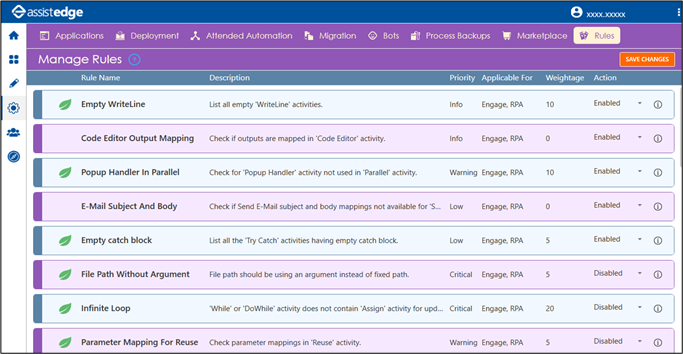Managing Rules
The Rules tab allows you to view and manage the set of predefined rules to analyze the process created in Automation Studio. It helps you to avoid the potential errors that might occur at the time of process execution. These rules help you understand if the activities are correctly used in the process workflow. Few examples of the rules are, using the same application activity inside itself, checking the duplicate display names of the activity.
By default, all the rules available in Automation Studio are disabled, enable the rules and then click SAVE CHANGES to use them for process analysis else the Process Analysis tab remains black.
|
NOTE: |
The Automation Studio user, who is assigned the role of a Super Admin in the Admin Module of AssistEdge RPA or Engage, can disable or enable a selected rule. See Default Roles to know about different roles in the Admin Module. |

The Manage Rules page displays the name of the rule, a small description and if the rule is applicable for AssistEdge RPA, AssistEdge Engage or both. Use the ![]() (More Info) icon to know about the rule details, recommendations, failed scenarios and expected scenarios of the selected rule.
(More Info) icon to know about the rule details, recommendations, failed scenarios and expected scenarios of the selected rule.
The configured rules can be categorized based on the following:
Priority:
- Critical- Indicates that the probability of failure of the process at run time is high if the concerned rule is violated.
- Warning- Indicates that occurrence of unexpected behavior of the process at run time . The process does not fail but may cause issues during execution.
- Low - Indicates that the probability of failure of the process at run time is low if the concerned rule is violated. The recommended change results in an improvised process design.
- Info- Provides recommendations for an improvised process design. The process does not fail but helps to build a robust process.
- Green RPA: The Green RPA rules have the icon next to them. These rules contribute towards reducing the number of coding lines needed to execute a process
Applicable For:
Indicates whether the rule is applicable for Engage, RPA or both Engage and RPA.
GQ Weightage:
The column lists the weightage associated with the Rules. The weightage numbers are based on the lines of code or complexity which can be optimized using the associated rule.
The PQM (Process Quality Metrics) score is derived using the sum of the weightage of rules, enabled during the analysis of the process in design phase and subtracting the weightage of rules, applied incorrectly during process analysis in studio. This helps the developers to adhere to a code quality metric and create efficient RPA processes.